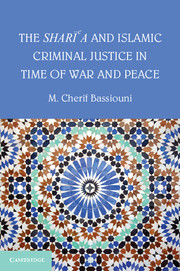Book contents
- Frontmatter
- Contents
- Glossary of Terms
- Table of Abbreviations
- Introduction
- 1 The Sharīca, Islamic Law (Fiqh), and Legal Methods (cIlm Uṣūl al-Fiqh)
- 2 The Postulates of Human Rights and the Place of Justice in Islam
- 3 The Islamic Criminal Justice System
- 4 Islamic International Law and International Humanitarian Law
- 5 The Sharīca, Islamic Law, and Contemporary Post-Conflict and Transitional Justice
- Appendix A Chronology of Significant Dates in the History of Islam
- Appendix B Armed Conflicts Involving Muslim States
- Appendix C Statute of the International Islamic Court of Justice
- Appendix D The Cairo Declaration on Human Rights in Islam
- Appendix E Convention of the Organization of the Islamic Conference on Combating International Terrorism
- Bibliography
- Index
- References
5 - The Sharīca, Islamic Law, and Contemporary Post-Conflict and Transitional Justice
Published online by Cambridge University Press: 05 June 2014
- Frontmatter
- Contents
- Glossary of Terms
- Table of Abbreviations
- Introduction
- 1 The Sharīca, Islamic Law (Fiqh), and Legal Methods (cIlm Uṣūl al-Fiqh)
- 2 The Postulates of Human Rights and the Place of Justice in Islam
- 3 The Islamic Criminal Justice System
- 4 Islamic International Law and International Humanitarian Law
- 5 The Sharīca, Islamic Law, and Contemporary Post-Conflict and Transitional Justice
- Appendix A Chronology of Significant Dates in the History of Islam
- Appendix B Armed Conflicts Involving Muslim States
- Appendix C Statute of the International Islamic Court of Justice
- Appendix D The Cairo Declaration on Human Rights in Islam
- Appendix E Convention of the Organization of the Islamic Conference on Combating International Terrorism
- Bibliography
- Index
- References
Summary
Introduction
The term “post-conflict justice” is preferable to “transitional justice,” because in many non-English languages, the word “transitional” modifies the word “justice,” rather than indicating the application of certain modalities of justice in states going through a transitional period. Justice cannot be transitional, though understandably there are in every nation's history transitional periods during which justice may be applied in different ways so as to achieve particular sociopolitical needs. Post-conflict justice and transitional justice employ similar mechanisms and modalities, including the international legal obligation to pursue accountability and prevent impunity whenever international humanitarian law (IHL) and international human rights law (IHRL) require it.
This is frequently the case in societies that have been affected by violent conflicts, large-scale victimization, and social disruptions. These situations and others cause states to stop functioning effectively or deliver services, including the preservation of the peace and security, public order, and justice. A state in this condition is often referred to as failed or failing.
The international community has come to address these situations, with a view to restoring or establishing peace and security, stability, democracy, and good governance, as post-conflict or transitional justice, whose modalities include:
international and national prosecutions for all or some of the perpetrators of international and national crimes;
the establishment of truth commissions or truth-telling bodies;
providing victims with various forms of remedies, reparations, and acknowledgement of their victimization;
providing administrative and political sanctions for perpetrators to prevent them from regaining access to power and thus repeating their misdeeds;
developing memorializations of events and educational programs to preserve historical memory, and to strengthen social resolve against the repetition of victimization;
instituting legal, administrative and political reform to prevent the recurrence of these conflicts; and
providing support for the rule of law to restore public trust, promote human rights and enhance democracy and good government.
- Type
- Chapter
- Information
- Publisher: Cambridge University PressPrint publication year: 2013

